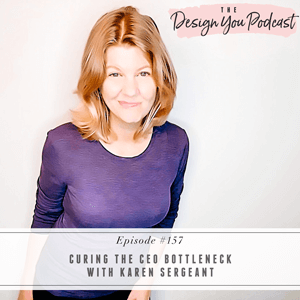
Bottleneck behaviors were once habits of success, but they can be problematic for you as the CEO of your business. It is no longer doing more that will get you to where you want to go, and by acknowledging your habits, you can cure the bottleneck you’re creating. Today’s guest joins me to explore this further.
Karen Sergeant is my COO, and the creator of BottleneckRx, a six-week program that helps CEOs remove themselves as the bottleneck in their growing business. She helps digital CEOs with operational planning to support six and seven-figure launches and businesses, and joins me today to discuss the importance of embracing uncertainty, how to get out of your own way in life, and to share what she’s learned from the first and second half of life.
Join us this week as we discuss how to work through the bottleneck issue in your business and why bottlenecks, boundaries, and ultimately happiness, are an inside job. Karen shares some second half of life wisdom and why it’s important to start listening to your intuition because it’s turning inwards that’s the answer. If you’re looking for more meaning in your life, friends, this episode could create some opportunity for you to explore that further!
If you want help creating a business with thriving revenue streams so that you can design the life you really want this year, now is your chance! We’re going to be opening the doors to the Design You Coaching Program really soon, get on our waitlist now!





